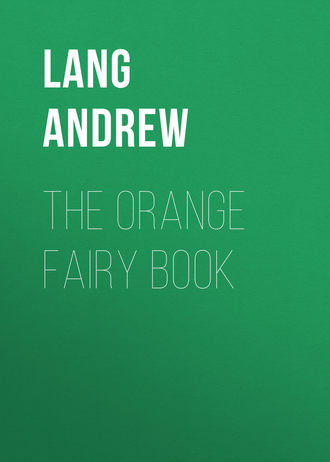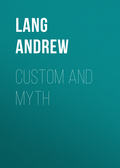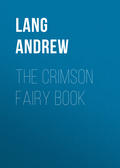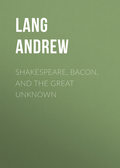
Lang Andrew
The Orange Fairy Book
The Adventures of a Jackal
[Thorpe’s Yule-Tide Stories.]
In a country which is full of wild beasts of all sorts there once lived a jackal and a hedgehog, and, unlike though they were, the two animals made great friends, and were often seen in each other’s company.
One afternoon they were walking along a road together, when the jackal, who was the taller of the two, exclaimed:
‘Oh! there is a barn full of corn; let us go and eat some.’
‘Yes, do let us!’ answered the hedgehog. So they went to the barn, and ate till they could eat no more. Then the jackal put on his shoes, which he had taken off so as to make no noise, and they returned to the high road.
After they had gone some way they met a panther, who stopped, and bowing politely, said:
‘Excuse my speaking to you, but I cannot help admiring those shoes of yours. Do you mind telling me who made them?’
‘Yes, I think they are rather nice,’ answered the jackal; ‘I made them myself, though.’
‘Could you make me a pair like them?’ asked the panther eagerly.
‘I would do my best, of course,’ replied the jackal; ‘but you must kill me a cow, and when we have eaten the flesh I will take the skin and make your shoes out of it.’
So the panther prowled about until he saw a fine cow grazing apart from the rest of the herd. He killed it instantly, and then gave a cry to the jackal and hedgehog to come to the place where he was. They soon skinned the dead beasts, and spread its skin out to dry, after which they had a grand feast before they curled themselves up for the night, and slept soundly.
Next morning the jackal got up early and set to work upon the shoes, while the panther sat by and looked on with delight. At last they were finished, and the jackal arose and stretched himself.
‘Now go and lay them in the sun out there,’ said he; ‘in a couple of hours they will be ready to put on; but do not attempt to wear them before, or you will feel them most uncomfortable. But I see the sun is high in the heavens, and we must be continuing our journey.’
The panther, who always believed what everybody told him, did exactly as he was bid, and in two hours’ time began to fasten on the shoes. They certainly set off his paws wonderfully, and he stretched out his forepaws and looked at them with pride. But when he tried to walk – ah! that was another story! They were so stiff and hard that he nearly shrieked every step he took, and at last he sank down where he was, and actually began to cry.
After some time some little partridges who were hopping about heard the poor panther’s groans, and went up to see what was the matter. He had never tried to make his dinner off them, and they had always been quite friendly.
‘You seem in pain,’ said one of them, fluttering close to him, ‘can we help you?’
‘Oh, it is the jackal! He made me these shoes; they are so hard and tight that they hurt my feet, and I cannot manage to kick them off.’
‘Lie still, and we will soften them,’ answered the kind little partridge. And calling to his brothers, they all flew to the nearest spring, and carried water in their beaks, which they poured over the shoes. This they did till the hard leather grew soft, and the panther was able to slip his feet out of them.
‘Oh, thank you, thank you,’ he cried, skipping round with joy. ‘I feel a different creature. Now I will go after the jackal and pay him my debts.’ And he bounded away into the forest.
But the jackal had been very cunning, and had trotted backwards and forwards and in and out, so that it was very difficult to know which track he had really followed. At length, however, the panther caught sight of his enemy, at the same moment that the jackal had caught sight of him. The panther gave a loud roar, and sprang forward, but the jackal was too quick for him and plunged into a dense thicket, where the panther could not follow.
Disgusted with his failure, but more angry than ever, the panther lay down for a while to consider what he should do next, and as he was thinking, an old man came by.
‘Oh! father, tell me how I can repay the jackal for the way he has served me!’ And without more ado he told his story.
‘If you take my advice,’ answered the old man, ‘you will kill a cow, and invite all the jackals in the forest to the feast. Watch them carefully while they are eating, and you will see that most of them keep their eyes on their food. But if one of them glances at you, you will know that is the traitor.’
The panther, whose manners were always good, thanked the old man, and followed his counsel. The cow was killed, and the partridges flew about with invitations to the jackals, who gathered in large numbers to the feast. The wicked jackal came amongst them; but as the panther had only seen him once he could not distinguish him from the rest. However, they all took their places on wooden seats placed round the dead cow, which was laid across the boughs of a fallen tree, and began their dinner, each jackal fixing his eyes greedily on the piece of meat before him. Only one of them seemed uneasy, and every now and then glanced in the direction of his host. This the panther noticed, and suddenly made a bound at the culprit and seized his tail; but again the jackal was too quick for him, and catching up a knife he cut off his tail and darted into the forest, followed by all the rest of the party. And before the panther had recovered from his surprise he found himself alone.
‘What am I to do now?’ he asked the old man, who soon came back to see how things had turned out.
‘It is very unfortunate, certainly,’ answered he; ‘but I think I know where you can find him. There is a melon garden about two miles from here, and as jackals are very fond of melons they are nearly sure to have gone there to feed. If you see a tailless jackal you will know that he is the one you want.’ So the panther thanked him and went his way.
Now the jackal had guessed what advice the old man would give his enemy, and so, while his friends were greedily eating the ripest melons in the sunniest corner of the garden, he stole behind them and tied their tails together. He had only just finished when his ears caught the sound of breaking branches; and he cried: ‘Quick! quick! here comes the master of the garden!’ And the jackals sprang up and ran away in all directions, leaving their tails behind them. And how was the panther to know which was his enemy?
‘They none of them had any tails,’ he said sadly to the old man, ‘and I am tired of hunting them. I shall leave them alone and go and catch something for supper.’
Of course the hedgehog had not been able to take part in any of these adventures; but as soon as all danger was over, the jackal went to look for his friend, whom he was lucky enough to find at home.
‘Ah, there you are,’ he said gaily. ‘I have lost my tail since I saw you last. And other people have lost theirs too; but that is no matter! I am hungry, so come with me to the shepherd who is sitting over there, and we will ask him to sell us one of his sheep.’
‘Yes, that is a good plan,’ answered the hedgehog. And he walked as fast as his little legs would go to keep up with the jackal. When they reached the shepherd the jackal pulled out his purse from under his foreleg, and made his bargain.
‘Only wait till to-morrow,’ said the shepherd, ‘and I will give you the biggest sheep you ever saw. But he always feeds at some distance from the rest of the flock, and it would take me a long time to catch him.’
‘Well, it is very tiresome, but I suppose I must wait,’ replied the jackal. And he and the hedgehog looked about for a nice dry cave in which to make themselves comfortable for the night. But, after they had gone, the shepherd killed one of his sheep, and stripped off his skin, which he sewed tightly round a greyhound he had with him, and put a cord round its neck. Then he lay down and went to sleep.
Very, very early, before the sun was properly up, the jackal and the hedgehog were pulling at the shepherd’s cloak.
‘Wake up,’ they said, ‘and give us that sheep. We have had nothing to eat all night, and are very hungry.’
The shepherd yawned and rubbed his eyes. ‘He is tied up to that tree; go and take him.’ So they went to the tree and unfastened the cord, and turned to go back to the cave where they had slept, dragging the greyhound after them. When they reached the cave the jackal said to the hedgehog.
‘Before I kill him let me see whether he is fat or thin.’ And he stood a little way back, so that he might the better examine the animal. After looking at him, with his head on one side, for a minute or two, he nodded gravely.
‘He is quite fat enough; he is a good sheep.’
But the hedgehog, who sometimes showed more cunning than anyone would have guessed, answered:
‘My friend, you are talking nonsense. The wool is indeed a sheep’s wool, but the paws of my uncle the greyhound peep out from underneath.’
‘He is a sheep,’ repeated the jackal, who did not like to think anyone cleverer than himself.
‘Hold the cord while I look at him,’ answered the hedgehog.
Very unwillingly the jackal held the rope, while the hedgehog walked slowly round the greyhound till he reached the jackal again. He knew quite well by the paws and tail that it was a greyhound and not a sheep, that the shepherd had sold them; and as he could not tell what turn affairs might take, he resolved to get out of the way.
‘Oh! yes, you are right,’ he said to the jackal; ‘but I never can eat till I have first drunk. I will just go and quench my thirst from that spring at the edge of the wood, and then I shall be ready for breakfast.’
‘Don’t be long, then,’ called the jackal, as the hedgehog hurried off at his best pace. And he lay down under a rock to wait for him.
More than an hour passed by and the hedgehog had had plenty of time to go to the spring and back, and still there was no sign of him. And this was very natural, as he had hidden himself in some long grass under a tree!
At length the jackal guessed that for some reason his friend had run away, and determined to wait for his breakfast no longer. So he went up to the place where the greyhound had been tethered and untied the rope. But just as he was about to spring on his back and give him a deadly bite, the jackal heard a low growl, which never proceeded from the throat of any sheep. Like a flash of lightning the jackal threw down the cord and was flying across the plain; but though his legs were long, the greyhound’s legs were longer still, and he soon came up with his prey. The jackal turned to fight, but he was no match for the greyhound, and in a few minutes he was lying dead on the ground, while the greyhound was trotting peacefully back to the shepherd.
The Adventures of the Jackal’s Eldest Son
[Nouveaux Contes Berberes, par Rene Basset.]
Now, though the jackal was dead, he had left two sons behind him, every whit as cunning and tricky as their father. The elder of the two was a fine handsome creature, who had a pleasant manner and made many friends. The animal he saw most of was a hyena; and one day, when they were taking a walk together, they picked up a beautiful green cloak, which had evidently been dropped by some one riding across the plain on a camel. Of course each wanted to have it, and they almost quarrelled over the matter; but at length it was settled that the hyena should wear the cloak by day and the jackal by night. After a little while, however, the jackal became discontented with this arrangement, declaring that none of his friends, who were quite different from those of the hyena, could see the splendour of the mantle, and that it was only fair that he should sometimes be allowed to wear it by day. To this the hyena would by no means consent, and they were on the eve of a quarrel when the hyena proposed that they should ask the lion to judge between them. The jackal agreed to this, and the hyena wrapped the cloak about him, and they both trotted off to the lion’s den.
The jackal, who was fond of talking, at once told the story; and when it was finished the lion turned to the hyena and asked if it was true.
‘Quite true, your majesty,’ answered the hyena.
‘Then lay the cloak on the ground at my feet,’ said the lion, ‘and I will give my judgment.’ So the mantle was spread upon the red earth, the hyena and the jackal standing on each side of it.
There was silence for a few moments, and then the lion sat up, looking very great and wise.
‘My judgment is that the garment shall belong wholly to whoever first rings the bell of the nearest mosque at dawn to-morrow. Now go; for much business awaits me!’
All that night the hyena sat up, fearing lest the jackal should reach the bell before him, for the mosque was close at hand. With the first streak of dawn he bounded away to the bell, just as the jackal, who had slept soundly all night, was rising to his feet.
‘Good luck to you,’ cried the jackal. And throwing the cloak over his back he darted away across the plain, and was seen no more by his friend the hyena.
After running several miles the jackal thought he was safe from pursuit, and seeing a lion and another hyena talking together, he strolled up to join them.
‘Good morning,’ he said; ‘may I ask what is the matter? You seem very serious about something.’
‘Pray sit down,’ answered the lion. ‘We were wondering in which direction we should go to find the best dinner. The hyena wishes to go to the forest, and I to the mountains. What do you say?’
‘Well, as I was sauntering over the plain, just now, I noticed a flock of sheep grazing, and some of them had wandered into a little valley quite out of sight of the shepherd. If you keep among the rocks you will never be observed. But perhaps you will allow me to go with you and show you the way?’
‘You are really very kind,’ answered the lion. And they crept steadily along till at length they reached the mouth of the valley where a ram, a sheep and a lamb were feeding on the rich grass, unconscious of their danger.
‘How shall we divide them?’ asked the lion in a whisper to the hyena.
‘Oh, it is easily done,’ replied the hyena. ‘The lamb for me, the sheep for the jackal, and the ram for the lion.’
‘So I am to have that lean creature, which is nothing but horns, am I?’ cried the lion in a rage. ‘I will teach you to divide things in that manner!’ And he gave the hyena two great blows, which stretched him dead in a moment. Then he turned to the jackal and said: ‘How would you divide them?’
‘Quite differently from the hyena,’ replied the jackal. ‘You will breakfast off the lamb, you will dine off the sheep, and you will sup off the ram.’
‘Dear me, how clever you are! Who taught you such wisdom?’ exclaimed the lion, looking at him admiringly.
‘The fate of the hyena,’ answered the jackal, laughing, and running off at his best speed; for he saw two men armed with spears coming close behind the lion!
The jackal continued to run till at last he could run no longer. He flung himself under a tree panting for breath, when he heard a rustle amongst the grass, and his father’s old friend the hedgehog appeared before him.
‘Oh, is it you?’ asked the little creature; ‘how strange that we should meet so far from home!’
‘I have just had a narrow escape of my life,’ gasped the jackal, ‘and I need some sleep. After that we must think of something to do to amuse ourselves.’ And he lay down again and slept soundly for a couple of hours.
‘Now I am ready,’ said he; ‘have you anything to propose?’
‘In a valley beyond those trees,’ answered the hedgehog, ‘there is a small farmhouse where the best butter in the world is made. I know their ways, and in an hour’s time the farmer’s wife will be off to milk the cows, which she keeps at some distance. We could easily get in at the window of the shed where she keeps the butter, and I will watch, lest some one should come unexpectedly, while you have a good meal. Then you shall watch, and I will eat.’
‘That sounds a good plan,’ replied the jackal; and they set off together.
But when they reached the farmhouse the jackal said to the hedgehog: ‘Go in and fetch the pots of butter and I will hide them in a safe place.’
‘Oh no,’ cried the hedgehog, ‘I really couldn’t. They would find out directly! And, besides, it is so different just eating a little now and then.’
‘Do as I bid you at once,’ said the jackal, looking at the hedgehog so sternly that the little fellow dared say no more, and soon rolled the jars to the window where the jackal lifted them out one by one.
When they were all in a row before him he gave a sudden start.
‘Run for your life,’ he whispered to his companion; ‘I see the woman coming over the hill!’ And the hedgehog, his heart beating, set off as fast as he could. The jackal remained where he was, shaking with laughter, for the woman was not in sight at all, and he had only sent the hedgehog away because he did not want him to know where the jars of butter were buried. But every day he stole out to their hiding-place and had a delicious feast.
At length, one morning, the hedgehog suddenly said:
‘You never told me what you did with those jars?’
‘Oh, I hid them safely till the farm people should have forgotten all about them,’ replied the jackal. ‘But as they are still searching for them we must wait a little longer, and then I’ll bring them home, and we will share them between us.’
So the hedgehog waited and waited; but every time he asked if there was no chance of getting jars of butter the jackal put him off with some excuse. After a while the hedgehog became suspicious, and said:
‘I should like to know where you have hidden them. To-night, when it is quite dark, you shall show me the place.’
‘I really can’t tell you,’ answered the jackal. ‘You talk so much that you would be sure to confide the secret to somebody, and then we should have had our trouble for nothing, besides running the risk of our necks being broken by the farmer. I can see that he is getting disheartened, and very soon he will give up the search. Have patience just a little longer.’
The hedgehop said no more, and pretended to be satisfied; but when some days had gone by he woke the jackal, who was sleeping soundly after a hunt which had lasted several hours.
‘I have just had notice,’ remarked the hedgehog, shaking him, ‘that my family wish to have a banquet to-morrow, and they have invited you to it. Will you come?’
‘Certainly,’ answered the jackal, ‘with pleasure. But as I have to go out in the morning you can meet me on the road.’
‘That will do very well,’ replied the hedgehog. And the jackal went to sleep again, for he was obliged to be up early.
Punctual to the moment the hedgehog arrived at the place appointed for their meeting, and as the jackal was not there he sat down and waited for him.
‘Ah, there you are!’ he cried, when the dusky yellow form at last turned the corner. ‘I had nearly given you up! Indeed, I almost wish you had not come, for I hardly know where I shall hide you.’
‘Why should you hide me anywhere?’ asked the jackal. ‘What is the matter with you?’
‘Well, so many of the guests have brought their dogs and mules with them, that I fear it may hardly be safe for you to go amongst them. No; don’t run off that way,’ he added quickly, ‘because there is another troop that are coming over the hill. Lie down here, and I will throw these sacks over you; and keep still for your life, whatever happens.’
And what did happen was, that when the jackal was lying covered up, under a little hill, the hedgehog set a great stone rolling, which crushed him to death.
The Adventures of the Younger Son of the Jackal
[Contes Berberes.]
Now that the father and elder brother were both dead, all that was left of the jackal family was one son, who was no less cunning than the others had been. He did not like staying in the same place any better than they, and nobody ever knew in what part of the country he might be found next.
One day, when we was wandering about he beheld a nice fat sheep, which was cropping the grass and seemed quite contented with her lot.
‘Good morning,’ said the jackal, ‘I am so glad to see you. I have been looking for you everywhere.’
‘For ME?’ answered the sheep, in an astonished voice; ‘but we have never met before!’
‘No; but I have heard of you. Oh! You don’t know what fine things I have heard! Ah, well, some people have all the luck!’
‘You are very kind, I am sure,’ answered the sheep, not knowing which way to look. ‘Is there any way in which I can help you?’
‘There is something that I had set my heart on, though I hardly like to propose it on so short an acquaintance; but from what people have told me, I thought that you and I might keep house together comfortably, if you would only agree to try. I have several fields belonging to me, and if they are kept well watered they bear wonderful crops.’
‘Perhaps I might come for a short time,’ said the sheep, with a little hesitation; ‘and if we do not get on, we can part company.’
‘Oh, thank you, thank you,’ cried the jackal; ‘do not let us lose a moment.’ And he held out his paw in such an inviting manner that the sheep got up and trotted beside him till they reached home.
‘Now,’ said the jackal, ‘you go to the well and fetch the water, and I will pour it into the trenches that run between the patches of corn.’ And as he did so he sang lustily. The work was very hard, but the sheep did not grumble, and by-and-by was rewarded at seeing the little green heads poking themselves through earth. After that the hot sun ripened them quickly, and soon harvest time was come. Then the grain was cut and ground and ready for sale.
When everything was complete, the jackal said to the sheep:
‘Now let us divide it, so that we can each do what we like with his share.’
‘You do it,’ answered the sheep; ‘here are the scales. You must weigh it carefully.’
So the jackal began to weigh it, and when he had finished, he counted out loud:
‘One, two, three, four, five, six, seven parts for the jackal, and one part for the sheep. If she likes it she can take it, if not, she can leave it.’
The sheep looked at the two heaps in silence – one so large, the other so small; and then she answered:
‘Wait for a minute, while I fetch some sacks to carry away my share.’
But it was not sacks that the sheep wanted; for as soon as the jackal could no longer see her she set forth at her best pace to the home of the greyhound, where she arrived panting with the haste she had made.
‘Oh, good uncle, help me, I pray you!’ she cried, as soon as she could speak.
‘Why, what is the matter?’ asked the greyhound, looking up with astonishment.
‘I beg you to return with me, and frighten the jackal into paying me what he owes me,’ answered the sheep. ‘For months we have lived together, and I have twice every day drawn the water, while he only poured it into the trenches. Together we have reaped our harvest; and now, when the moment to divide our crop has come, he has taken seven parts for himself, and only left one for me.’
She finished, and giving herself a twist, passed her woolly tail across her eyes; while the greyhound watched her, but held his peace. Then he said:
‘Bring me a sack.’ And the sheep hastened away to fetch one. Very soon she returned, and laid the sack down before him.
‘Open it wide, that I may get in,’ cried he; and when he was comfortably rolled up inside he bade the sheep take him on her back, and hasten to the place where she had left the jackal.
She found him waiting for her, and pretending to be asleep, though she clearly saw him wink one of his eyes. However, she took no notice, but throwing the sack roughly on the ground, she exclaimed:
‘Now measure!’
At this the jackal got up, and going to the heap of grain which lay close by, he divided it as before into eight portions – seven for himself and one for the sheep.
‘What are you doing that for?’ asked she indignantly. ‘You know quite well that it was I who drew the water, and you who only poured it into the trenches.’
‘You are mistaken,’ answered the jackal. ‘It was I who drew the water, and you who poured it into the trenches. Anybody will tell you that! If you like, I will ask those people who are digging there!’
‘Very well,’ replied the sheep. And the jackal called out:
‘Ho! You diggers, tell me: Who was it you heard singing over the work?’
‘Why, it was you, of course, jackal! You sang so loud that the whole world might have heard you!’
‘And who it is that sings – he who draws the water, or he who empties it?’
‘Why, certainly he who draws the water!’
‘You hear?’ said the jackal, turning to the sheep. ‘Now come and carry away your own portion, or else I shall take it for myself.’
‘You have got the better of me,’ answered the sheep; ‘and I suppose I must confess myself beaten! But as I bear no malice, go and eat some of the dates that I have brought in that sack.’ And the jackal, who loved dates, ran instantly back, and tore open the mouth of the sack. But just as he was about to plunge his nose in he saw two brown eyes calmly looking at him. In an instant he had let fall the flap of the sack and bounded back to where the sheep was standing.
‘I was only in fun; and you have brought my uncle the greyhound. Take away the sack, we will make the division over again.’ And he began rearranging the heaps.
‘One, two, three, four, five, six, seven, for my mother the sheep, and one for the jackal,’ counted he; casting timid glances all the while at the sack.
‘Now you can take your share and go,’ said the sheep. And the jackal did not need twice telling! Whenever the sheep looked up, she still saw him flying, flying across the plain; and, for all I know, he may be flying across it still.






